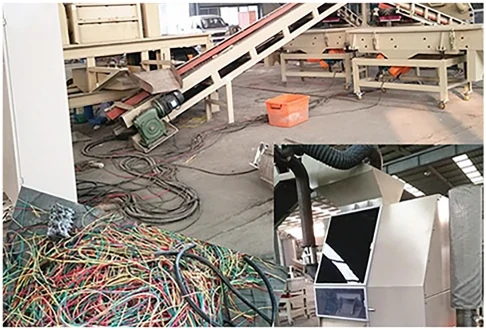

Aug . 21, 2024 16:01 Back to list
The Essential Role of Tin Can Shredders in Recycling
As the world becomes more environmentally conscious, the need for effective recycling methods has never been more critical. Among various recycling technologies, tin can shredders play a vital role in the metal recycling industry. These machines not only help in the efficient processing of tin cans but also contribute significantly to reducing waste and conserving resources.
Understanding Tin Can Shredders
A tin can shredder is a specialized piece of machinery designed to break down metal cans into smaller pieces. This process is essential because it prepares the metal for melting and remanufacturing into new products. By reducing the size of the metal, shredders facilitate easier handling, transportation, and processing in recycling facilities. Most tin can shredders work by using powerful blades to slice through the metal, creating shreds that can range from small flakes to larger pieces, depending on the model and settings.
Environmental Impact
The environmental benefits of using tin can shredders are substantial. First and foremost, recycling metal saves energy. Producing new aluminum and steel from raw materials requires significantly more energy than processing recycled metals. For instance, recycling aluminum can save up to 95% of the energy needed to create new aluminum from bauxite ore. By shredding tin cans and sending them for recycling, we are effectively conserving energy and reducing our carbon footprint.
Moreover, every ton of recycled steel can save up to 1,500 pounds of iron ore and 1,000 pounds of coal. These reductions in resource extraction not only help preserve natural habitats but also diminish the harmful environmental impact associated with mining operations. Tin can shredders thus contribute directly to a circular economy, where materials are continuously reused and recycled, minimizing waste and the depletion of natural resources.

Cost Efficiency
In addition to their environmental benefits, tin can shredders also offer economic advantages. Recycling metal is often less expensive than producing new metal. The initial investment in a tin can shredder can pay off through the cost savings realized over time. By processing recycled materials in-house, businesses can reduce their reliance on external sources for raw materials, thereby cutting down on costs associated with purchasing new metals.
As the demand for recycled metals increases, the market value for shredded tin can materials also rises, creating a profitable business model for recycling companies. Shredders can help facilities operate more efficiently, processing larger quantities of material in a shorter time, leading to increased output and revenue.
The Future of Metal Recycling
The future of metal recycling, particularly with tin cans, looks promising, especially with advancements in shredding technology. Modern shredders are becoming more automated and energy-efficient, incorporating features such as smart sensors and computer controls that optimize performance. These innovations not only enhance productivity but also minimize waste and further reduce the environmental impact of shredding operations.
Public awareness and participation in recycling programs are also critical. Educational campaigns about the importance of recycling tin cans and other metals can increase community involvement and boost the supply of recyclable materials. As more individuals understand the importance of their actions in the recycling process, the demand for tin can shredders—and the recycling industry as a whole—will continue to grow.
In conclusion, tin can shredders are a crucial element in the larger narrative of recycling and waste management. Their role in efficiently processing metal wastes, conserving energy, and supporting sustainable business practices cannot be overstated. As we strive towards a more sustainable future, the continued evolution and adoption of tin can shredders will play a significant part in shaping the recycling landscape and fostering environmental stewardship.
Latest news
Troubleshooting Common Eddy Separator Problems
NewsJul.04,2025
The Role of Metal Recycling Plants in Circular Economy
NewsJul.04,2025
The Impact of Recycling Line Pickers on Waste Management Costs
NewsJul.04,2025
Safety Features Every Metal Shredder Should Have
NewsJul.04,2025
How Industrial Shredders Improve Waste Management Systems
NewsJul.04,2025
How Cable Granulators Contribute to Sustainable Recycling
NewsJul.04,2025